

Local Judges (2): Francis Oswald Langley (1884-1947)
|
Djavid Bey was delivering a political speech at the far end of the apartment. He concluded amid rounds of applause from his fellow-prisoners, and then welcomed the journalist. Together they made a tour of inspection of the sumptuous house of detention, where the prisoners' rooms are decorated every day with fresh-cut flowers and where the sentries are expected by the governor to wait on the prisoners. When the correspondent was about to leave Djavid Bey said, I will accompany you on your way. The prison doors were opened to him without the slightest demur, and half an hour later,the ex-Minister bade the journalist farewell, saying that it was too cold to stay out late, and that he was returning home. |
||
|
I saw McKenna worn and pale With efforts always doomed to fail To keep his Suffragettes in gaol. I saw him read of Djavid Bey And smile. I even heard him say Ah! Now, of course, I see a way. Suggestion, artfully conveyed, Is bound, if subtle, to persuade The childish mind which won't be 'made'. |
So let us, as a last resource, Tempt with a luncheon (fifteen course) Those whom we cannot feed by force. Our residents shall dine as well As in the costliest hotel; Such dishes, that their very smell Compels a movement of the jaws, Forbids the Militant to pause And think about her tiresome Cause. Our daily fare shall lick to fits The Carlton or Savoy or Ritz, And each shall have her fav'rite bits. |
'Twas done. The quality was such As none could say I will not touch! The quantity was very much. Lives there a man who ever yet Contrived a means by which to get The better of the Suffragette? She did not hunger-strike. Instead She got herself as good as dead By other means. She overfed. |
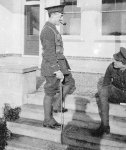 Langley
served throughout the war; he enlisted as a Lieutenant in the 1/6th
Battalion South Staffordshire Regiment [right in 1916], serving
on the front line, was awarded the Military Cross in 1916 and was
promoted to Captain, and then Major, joining the Intelligence Staff; he
was twice mentioned in dispatches, and was also awarded the Legion of
Honour. During the war, Punch ran an anonymous feature 'The Watchdogs' by various writers, including Langley. In the words of one later commentator, he transmuted
trench warfare into a laconic exchange of letters between one languid
young officer, Henry, to another, Charles. The ghastly conditions in
Flanders were again domesticated [as other writers had done].
The other ranks are portrayed as brave, cheeky children whose delight
is to annoy the neighbours, some humourless Germans on the other side
of a 'well known and highly-respected turnip field' ... Henry describes
a sentry shouting 'gas!' then collapsing. The men blaze away at
attackers who never come, one Tommy yelling 'Put another shilling in
the meter, Allemand'.Tall tales were later told of braving 'black
clouds and pungent smells'. But Henry can find no evidence of the
emission of gas by the Germans; on the other hand, he asks Charles,
what is to be made of the fact that the sentry, 'notoriously imprudent
in his consumption of the Tinned Meat and Vegetable Ration', had that
night 'excelled all his own previous efforts with the rich gravy'? Some of this material was included in the The War History of the Sixth Battalion of the South Staffordshire Regiment (Heinemann 1924).
Langley
served throughout the war; he enlisted as a Lieutenant in the 1/6th
Battalion South Staffordshire Regiment [right in 1916], serving
on the front line, was awarded the Military Cross in 1916 and was
promoted to Captain, and then Major, joining the Intelligence Staff; he
was twice mentioned in dispatches, and was also awarded the Legion of
Honour. During the war, Punch ran an anonymous feature 'The Watchdogs' by various writers, including Langley. In the words of one later commentator, he transmuted
trench warfare into a laconic exchange of letters between one languid
young officer, Henry, to another, Charles. The ghastly conditions in
Flanders were again domesticated [as other writers had done].
The other ranks are portrayed as brave, cheeky children whose delight
is to annoy the neighbours, some humourless Germans on the other side
of a 'well known and highly-respected turnip field' ... Henry describes
a sentry shouting 'gas!' then collapsing. The men blaze away at
attackers who never come, one Tommy yelling 'Put another shilling in
the meter, Allemand'.Tall tales were later told of braving 'black
clouds and pungent smells'. But Henry can find no evidence of the
emission of gas by the Germans; on the other hand, he asks Charles,
what is to be made of the fact that the sentry, 'notoriously imprudent
in his consumption of the Tinned Meat and Vegetable Ration', had that
night 'excelled all his own previous efforts with the rich gravy'? Some of this material was included in the The War History of the Sixth Battalion of the South Staffordshire Regiment (Heinemann 1924).| How Straits Chinese Stopped Cheats (in The Crown Colonist vol 12,1942) Mr. F. O. Langley, a Metropolitan Police Magistrate and a former Law Officer in the Straits Settlements, has recalled an experience illustrating the qualities of the Straits Chinese. There was an epidemic of fraud in local Oriental commerce, the flooding of the markets with lead pencils devoid of lead therein, and with reels of sewing cotton found on use to be a little too much reel and much too little cotton. Japanese origin was clear. Chinese probity was anxious to be vindicated. A deputation of the Chinese business community approached Mr. Langley with an offer of voluntary aid to expose the evil and to identify and convict the cheats. Chinese sentiment is essentially practical: their first-named contribution was the manufacture of special machinery to measure cotton-reels at retail and the offer to instal the necessary plant and personnel at their own expense — the Straits dollar equivalent of £12,000. Chinese worth and humour need to be appreciated. Japanese characteristics of ill-temper and vice need to be explained, he writes. |
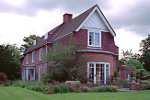 On
his return to England, Langley was appointed Recorder of Oswestry,
and later as deputy stipendiary magistrate for Wolverhampton.
(Before the war he had been a director of a Wolverhampton brewery, W
Butler & Co.) He was also appointed Chancellor (an ecclesiastical
judge: the bishop's senior legal officer, who holds 'consistory' courts
and issues judgements on ecclesiastical matters) of the diocese of
Lichfield. At this time they lived at Abbot's Lodge, Sibton, near
Saxmundham in Suffolk - anciently a dower house for
Sibton Abbey (a Cistertian house), rebuilt in the 18th century with
various later additions, it was listed Grade II in 1951 [left].
On
his return to England, Langley was appointed Recorder of Oswestry,
and later as deputy stipendiary magistrate for Wolverhampton.
(Before the war he had been a director of a Wolverhampton brewery, W
Butler & Co.) He was also appointed Chancellor (an ecclesiastical
judge: the bishop's senior legal officer, who holds 'consistory' courts
and issues judgements on ecclesiastical matters) of the diocese of
Lichfield. At this time they lived at Abbot's Lodge, Sibton, near
Saxmundham in Suffolk - anciently a dower house for
Sibton Abbey (a Cistertian house), rebuilt in the 18th century with
various later additions, it was listed Grade II in 1951 [left].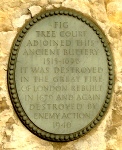 In 1926, from Abbot's Lodge, from Brook's Club and from his chambers at 7
Fig Tree Court, Inner Temple (blitzed in 1940 - right) he wrote various letters
to James Smyth & Son, Peasenhall, Suffolk, at first attempting to
help them find new markets during the depression, but then turning into
a bid for the company, which was rejected - details in Leslie Larnder Smyths of Peasenhall (2002). In that same
year, he was appointed by the Ministry of Transport to hear appeals
from bus proprietors against decisions of the joint committee set up to
licence and control bus traffic between Barrow, Dalston and Ulverston,
which were being developed to cope with increased demand (including the
purchase of four 26-seater buses for the new coast road to Ulverston in
the summer).
In 1926, from Abbot's Lodge, from Brook's Club and from his chambers at 7
Fig Tree Court, Inner Temple (blitzed in 1940 - right) he wrote various letters
to James Smyth & Son, Peasenhall, Suffolk, at first attempting to
help them find new markets during the depression, but then turning into
a bid for the company, which was rejected - details in Leslie Larnder Smyths of Peasenhall (2002). In that same
year, he was appointed by the Ministry of Transport to hear appeals
from bus proprietors against decisions of the joint committee set up to
licence and control bus traffic between Barrow, Dalston and Ulverston,
which were being developed to cope with increased demand (including the
purchase of four 26-seater buses for the new coast road to Ulverston in
the summer). |
A man described as a political officer [elsewhere he was said to be an
editor], and also as a Fascist, who was alleged to have attacked Jews
in a speech at an open-air meeting, was again before Mr F.O. Langley,
the Old Street magistrate, in London. He was Alexander Raven Thomson,
aged 36, of Carlyle Square, Chelsea. He was charged with using insulting
words whereby a breach of the peace might have been caused at Victoria
Park Square, Bethnal Green. Police witnesses who gave evidence previously said that his remarks included: The Arabs fought a damn sight better than the Jews ever did. How many Jews were with Clive in India? How many Jews were with Wolfe in Canada? Who made money out of the South African War? Jews, of course. Lawrence of Arabia promised Palestine to the Arabs for fighting on our side, and the sending of British troops to Palestine to suppress the Arabs is an insult to his memory. Our boys are being killed, and for what? Purely Jewish interests. Detective-Sergeant Joss, of the Special Branch, Scotland Yard, who had given evidence as to a note he had taken on Thomson's speech, was recalled. Mr F.H. Lawton, defending, said he hoped to show that the parts of the speech dealing with the Jews were auxiliary to the main part, which was political. Cross-examined by Mr Lawton, Sergeant Joss agreed that Thomson told his audience all about motor roads in Germany and how they were built. He also spoke of the economic and general progress being made in Germany. There were 14 minutes of the speech in which there was no suggestion of anything insulting about the Jews. Mr Lawson said Therefore, it if is suggested, as I understand it is, that this speech consisted of a direct attack on the Jews, that is untrue so far as we have gone. Sergeant Joss said that it would be rather difficult to hear everything the speaker said. He was not suggesting that his report was word accurate. The general tenor of the speech was right. Mr Lawton said that if it were contended that he had a case to answer, no Fascist speakers would be able to criticise Jews in public places in future. Henry C. Clark, who said that he was in charge of the meeting, stated that he did not notice any particular interruption, nor did he see any fighting. Mr Langley giving his decision said: I do not think the conduct of the police is to be criticised in the least particular. The police are bound to take preventive action, and they can take no more admirable step than to arrest a man upon whose head the quarrel rages and to bring him here and present a note of his speech, leaving the Court to decide. The Court holds and expresses no views about Fascism or Communism. It is not interested in either, but the question of Jew-baiting is a matter upon which it has to express an opinion. If Fascists come down and make wholesale attacks on a law-abiding community they will be punished fully for using insulting words, and certainly bound over to find sureties to discontinue this conduct. If on the other hand a coterie of Jews or somebody else claiming to associate with Jews challenges the remarks, Thomson is free to deal with the challenge and comment on the Jews in the same way. Mr Langley, commenting on an alleged remark by Thomson in which reference was made to Jews and Marxists, said that what followed flowed from that. If the statement he had singled out had been made deliberately and intentionally with reference to the conduct of Jewish ex-Servicemen he should have regarded is as not wholly untrue but as offensive. I am satisfied, concluded Mr Langley, that no such statement was ever intended or made. The charge was dismissed. |
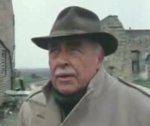

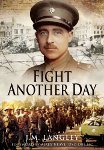
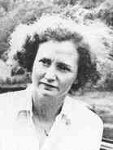 James Maydon Langley MBE MC (1916-83)
James Maydon Langley MBE MC (1916-83)««« Policing, Magistrates' & Other Courts | ««« Judges | ««« Cable Street | ««« History